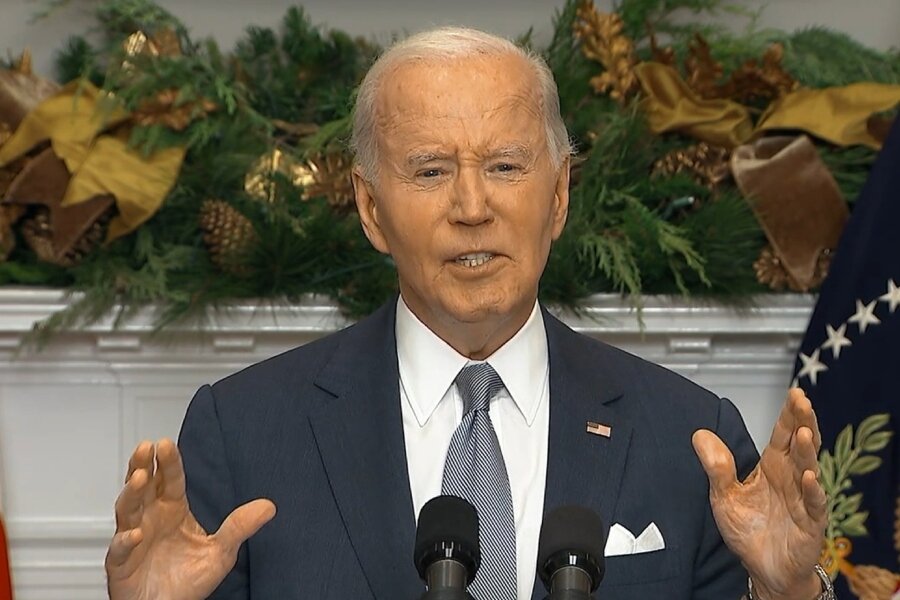The White House announced on Dec. 10 that President Joe Biden intends to veto a bipartisan bill proposing the first significant expansion of federal district court judgeships in more than 30 years.
The legislation, known as S. 4199, or the Judicial Understaffing Delays Getting Emergencies Solved (JUDGES) Act of 2024, aims to address caseload backlogs by creating 63 permanent and three temporary judgeships phased in over a decade. The measure was passed unanimously by the Senate in August and was directed to the House for consideration, where Democrat support is waning as political dynamics have shifted post-election.
House Republicans are moving to advance the legislation before the close of the 118th Congress, but congressional Democrats argue that the measure’s timing undermines its original bipartisan intent.
The White House weighed in on the controversy on Dec. 10, issuing a statement of administration policy panning the bill as “unnecessary to the efficient and effective administration of justice.”
The statement argued that the legislation has not fully accounted for existing judicial resources, such as senior-status judges and magistrates.
The Biden administration also took issue with the timing of the legislation, noting that the House delayed consideration until after the election when Trump’s victory assured him the opportunity to make the initial wave of appointments.
“Hastily adding judges with just a few weeks left in the 118th Congress would fail to resolve key questions, especially regarding how the judges are allocated,” the statement said. It also pointed to “efforts by some Senators to hold open existing judicial vacancies” as evidence that judicial economy and caseload management were not the primary motivations for the bill’s passage.
The statement concludes: “If the President were presented with S. 4199, he would veto it.”
Democrats contend that bipartisan support that propelled the JUDGES Act through the Senate in August was predicated on the assumption that neither party knew which presidential candidate would oversee the first batch of appointments. With Trump’s victory, Democrats say that the bill’s fairness has been compromised.
Rep. Jerry Nadler (D-N.Y.), ranking member of the Judiciary Committee, accused Republicans of delaying the bill until after the election to ensure that their preferred candidate benefitted.
“Now here they are today, during the narrow window when the central premise behind the JUDGES Act is broken, trying to force this bill through the House on a partisan basis,” Nadler said.
House Republicans say that the JUDGES Act addresses an urgent need to expand the judiciary. Rep. Jim Jordan (R-Ohio), chair of the Judiciary Committee, said during the Dec. 10 hearing that the bill allocates judgeships fairly, with several appointments going to states represented by Democratic senators.
Under the current blue-slip system, which allows senators to veto judicial nominees in their states, both parties retain significant influence over the process.
“Conference says we need it, everyone knows we need it, it came out of the Senate unanimously,” Jordan said. “The first 22 judges that President Trump will get a chance to nominate, I believe 10 or 11 come from states where both senators are Democrats and they will weigh in on the process. I don’t know how you make it any fairer than what it is,” Jordan said.
Sen. Todd Young (R-Ind.), the bill’s co-sponsor, criticized the White House’s veto threat and urged Biden to sign it if it makes it to his desk.
“President Biden just threatened to veto my JUDGES Act of 2024, which would resolve the judicial crisis that has Americans waiting years for their day in court,” Young said in a statement.
“My broadly bipartisan bill is a common sense approach to a politically challenging problem and is widely supported by leading legal organizations across our country.”
The JUDGES Act represents the most extensive expansion of the federal judiciary since 1990 when Congress added 74 district court judgeships and 11 circuit court seats. The current measure follows recommendations from the Judicial Conference of the United States, which identified the need for 66 new judgeships across 25 districts in 13 states, including three temporary positions in Oklahoma.
The bill’s phased rollout, beginning in January 2025, seeks to mitigate concerns about partisan exploitation. Trump would appoint 22 permanent and three temporary judges during his term, while subsequent administrations would oversee the remaining appointments through 2035.
The judiciary currently has 677 authorized district court seats and 10 temporary ones.
Share your thoughts by scrolling down to leave a comment.













